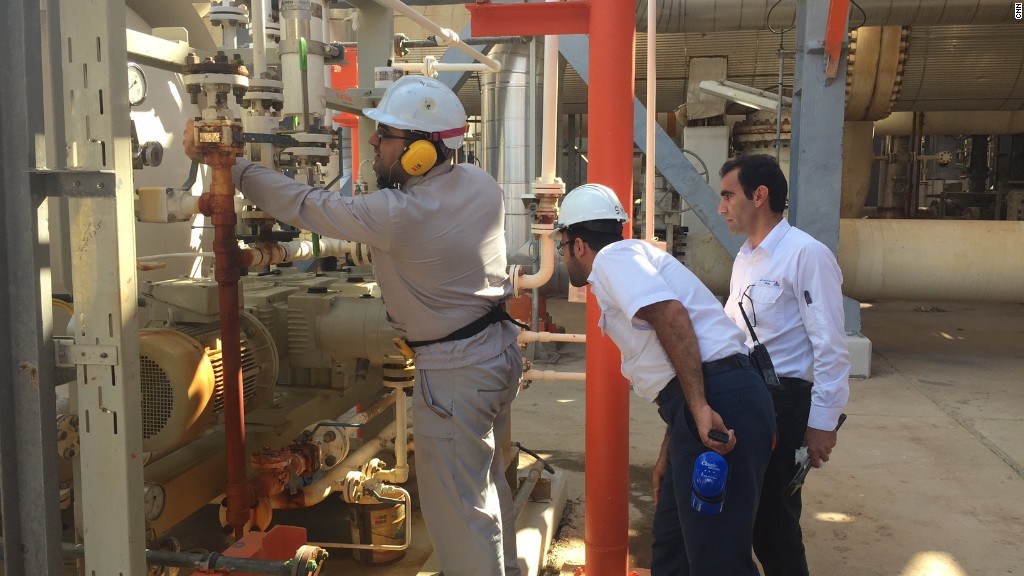
Iran would welcome American dollars being pumped into its aging oil and gas industry.
At least that's the message from Iran's oil minister. "In general, we have no problem with the presence of American companies in Iran," Bijan Namdar Zangeneh said on Sunday, confirming talks between the state oil company and U.S. giant General Electric.
"It is the American government which is creating restrictions for these companies," the Iranian oil minister said, according to the state-run Press TV.
Iran is staging a big economic comeback following its landmark nuclear deal with global powers. The country's enormous oil and natural gas resources are at the center of the rebound -- but years of economic isolation have left Iran's energy infrastructure seriously outdated.
That's why Iran has been trying to drum up Western investments. For instance, in January French oil giant Total (TOT) signed a memorandum of understanding to buy crude oil from Iran and weigh potential investments in the country's oil industry.
"Iran is desperate for investment in its oil and gas infrastructure in order to catch up with Saudi Arabia, Kuwait, Qatar," said Majid Rafizadeh, a Middle East scholar at Harvard.
But don't bank on Iran scoring huge deals from the likes of America's ExxonMobil (XOM) and Chevron (CVX) just yet.
"It is not realistic," said Jason Bordoff, a professor at Columbia University and a former energy adviser to President Obama.
Related: Will Iran get a McDonald's now?
That's because the U.S. still has sanctions in place that block most American companies from investing in Iran. They are different from the ones that were lifted in January, which cleared the way for non-U.S. citizens and businesses to head to Iran without fear of American penalties.
"This is a freebie for (the Iranian oil minister). He can offer it knowing it won't be taken up because of tight restrictions by the U.S. government," said Patrick Clawson, research director at the Washington Institute for Near East Policy.
The sanctions relief has made it possible for the U.S. to export some items to Iran, including commercial planes. Iran's transport minister recently told CNN Iran wants to spend heavily with Boeing (BA) as well as Europe's Airbu (EADSF)s.
But it's not clear that hardliners in Tehran would be as enthusiastic as Zangeneh about the idea of American investment in country's prized oil and gas industry.
"There would be a great deal of criticism at home," said Clawson, who noted that Zangeneh has been a "controversial figure and a lightning rod for conservatives."
Related: Iran emerges the shadows with huge untapped potential
Even if the legal and political obstacles were cleared, investing in any country's oil and gas business isn't exactly a slam dunk these days. Oil and natural gas companies have dramatically slashed investments due to a crash in prices caused by a massive supply glut.
"There isn't the extra demand for higher production. It's not a great moment right now," said Clawson.
Still, at least one large American company has started to look at ways to take part in Iran's economic comeback.
General Electric (GE) confirmed in a statement that it has "begun looking at potential business opportunities in Iran, while fully complying with the rules laid out by the U.S. government."
Aside from the oil and gas talks, GE is looking to make deals with Iran's aviation industry. GE has requested permission from the U.S. to sell commercial aircraft engines, parts and services to Iranian air carriers.
Iran's energy market clearly offers huge opportunity. Not only does Iran sit on 9% of the world's proven oil reserves, the country also claims nearly one-fifth of the planet's natural gas reserves.
But Iran's efforts to lure foreign investment in this area seems to be facing some barriers. Iran has repeatedly canceled a London conference organized by the oil ministry that was aimed at discussing a contract allowing foreign oil companies to invest in the country's infrastructure.
--CNNMoney's Jim Boulden, John Defterios and Heather Long contributed to this report.


